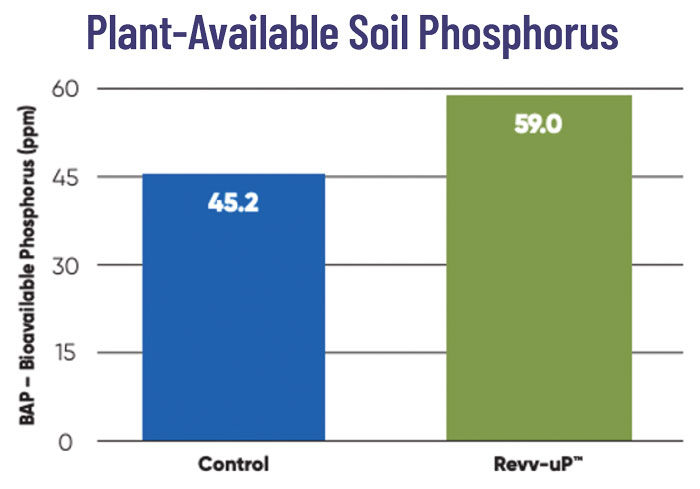No-Till Farmer
Get full access NOW to the most comprehensive, powerful and easy-to-use online resource for no-tillage practices. Just one good idea will pay for your subscription hundreds of times over.

TRIAL DATA. Simplot’s Revv-Up increased bioavailable phosphorus by 13.8 ppm, according to an average of four greenhouse pot study trials by the company’s trial partner. Source: Simplot 2023 Revv-Up Sales Sheet
When no-tillers and researchers talk about the benefits of soil microbes populating the root zone of field crops, the conversation generally revolves around more efficient plant use of nitrogen and potential reductions in losses of plant life’s hard-to-hang-onto primary food source.
This year, however, corn growers across the South, parts of the Corn Belt, the Great Plains and California have been growing populations of microbes found to boost the mineralization and cycling of phosphorus (P) — another important macronutrient for plant growth. P is often tightly bound chemically to clay particles in the soil. Because of those bonds, P levels can accumulate faster than crops can access them In farm fields heavily fertilized with poultry or cattle manure — until recently.
We talked early this season with Justin McCoy a senior agronomist for Simplot, part of Innvictis Bioscience, about the company’s recent fielding of two specific growth-promoting rhizobacteria that mineralize bound-up P and transform it into the phosphate form readily useable by growing crops. The product, Revv-Up, contains the bacteria in a long-lasting spore form that “inoculates” the soil to foster populations of the rhizobacteria. Revv-Up can be applied in several ways with dry or liquid applications, in-furrow or at sidedress, to boost available P at critical plant growth stages.
McCoy says the bacteria were originally found growing naturally in a P mine, feeding on the element and mineralizing it there. They were cultured in a laboratory setting, where their ability to improve P cycling became obvious. Researchers…